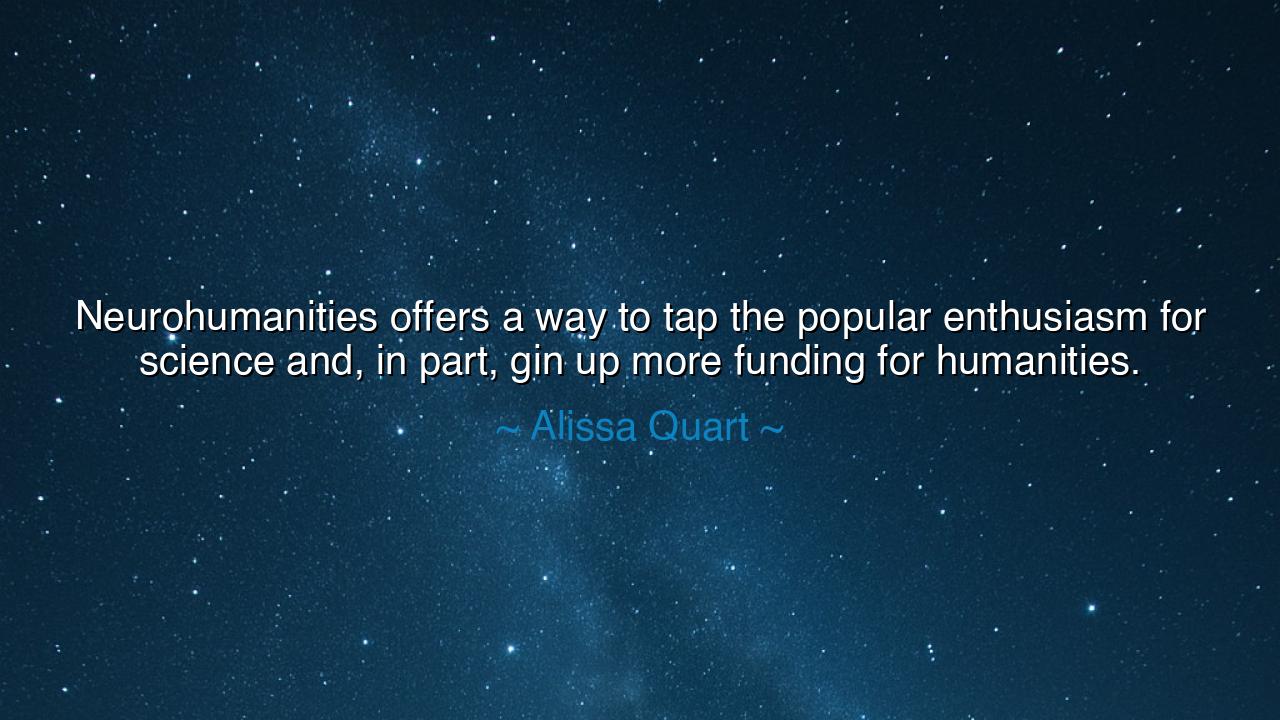
Neurohumanities offers a way to tap the popular enthusiasm for
Neurohumanities offers a way to tap the popular enthusiasm for science and, in part, gin up more funding for humanities.






Hear now, O seekers of truth, the words of Alissa Quart, whose insight reveals the union of two great forces—science and the humanities: "Neurohumanities offers a way to tap the popular enthusiasm for science and, in part, gin up more funding for humanities." These words speak to the intersection of two domains: the scientific world, which has long captivated the public’s imagination, and the humanities, which have often struggled for recognition in the modern age. Quart offers a vision where these realms, which seem so distant from one another, can unite in a common pursuit—both to elevate our understanding of the human experience and to ensure that the humanities remain vital and relevant in an increasingly scientific world.
In the ancient world, the study of human nature was the very heart of philosophy. Think of Socrates, who questioned the nature of existence, the soul, and morality—not through scientific experimentation, but through the philosophical method of dialogue. He sought to understand the depths of human thought and action, knowing that the pursuit of wisdom transcends the boundaries of the physical world. Yet, as science began its rise in the Renaissance and beyond, there was often a divide—a tension between the scientific and the humanistic. While science sought to explore the workings of the natural world, the humanities remained focused on the individual, the soul, and the mysteries of consciousness. Yet Quart suggests that we now stand at a moment where these two fields may no longer be separate, but might come together to illuminate the human experience in ways previously unimaginable.
Consider, O wise ones, the story of René Descartes, who sought to reconcile the workings of the mind with the workings of the body. In his time, the mind and body were often treated as separate, distinct realms—one governed by philosophy, the other by science. Yet Descartes’s famous dictum, "Cogito, ergo sum" ("I think, therefore I am"), was an early attempt to bridge this divide. He understood that the study of the human mind and the material body must not be seen as opposing forces but as complementary. This pursuit—the blending of philosophy and science—was a precursor to what Quart envisions with neurohumanities: a blending of neuroscience and humanistic inquiry to better understand the nature of human existence.
Fast forward to today, when the field of neurohumanities has emerged, bringing together the hard sciences of neuroscience with the introspective studies of the human condition. This blending is more than just academic curiosity; it is a strategic marriage designed to capture the public’s enthusiasm for science while reinvigorating interest in the humanities. Through the lens of neuroscience, the study of the human experience can take on a new dimension, exploring how the brain shapes our emotions, our actions, and our very sense of self. In this way, neurohumanities offers a fresh way to explore timeless questions—about the mind, the soul, and the nature of consciousness—by drawing on the methods of science to answer age-old philosophical questions.
Consider the work of Antonio Damasio, a pioneering neuroscientist whose studies have bridged the gap between neuroscience and philosophy. In his book Descartes' Error, Damasio explores how emotions and the body are intertwined with our reasoning and our decisions. By combining neuroscience with the insights of philosophy, Damasio has contributed to our understanding of how the brain and body work together to shape our experiences, our thoughts, and our identities. Quart’s vision for neurohumanities seeks to build upon this foundation—creating a space where both science and the humanities can work in tandem to explore the deepest mysteries of human nature.
The lesson here, O wise ones, is that the path of human understanding must not be a journey of division, but one of integration. The scientific method has unlocked many of the secrets of the natural world, yet it has often neglected the mysteries of the mind and the soul. The humanities, on the other hand, have long sought to understand the nature of human existence but have lacked the tools of science to fully explore how the brain and body shape our experiences. Neurohumanities offers a path forward, uniting these fields and enabling us to explore human existence from both the inside—through philosophy, literature, and history—and from the outside—through the lenses of biology and neuroscience.
Thus, the challenge for us, O seekers, is to embrace the wisdom of neurohumanities in our own lives. We must learn to think not just in terms of separate disciplines, but in integrated ways that draw from both science and the humanities. By doing so, we deepen our understanding of who we are, how we think, and how we can grow. Whether in the study of the mind, the creation of art, or the pursuit of knowledge, we must strive to blend the rigorous methods of science with the profound insights of humanistic inquiry, for only through such integration can we fully understand the vast complexity of the human experience.
Let us then, O wise ones, take this wisdom into our lives. Neurohumanities calls us to explore not just the mechanics of the brain, but the essence of what makes us human. It challenges us to unite mind and matter, emotion and reason, and to find new ways of understanding our existence in both scientific and philosophical terms. In this way, we honor both the material and the spiritual, the scientific and the human, creating a future where the pursuit of knowledge is not confined to one domain but is a journey of the whole self—body, mind, and spirit.






AAdministratorAdministrator
Welcome, honored guests. Please leave a comment, we will respond soon